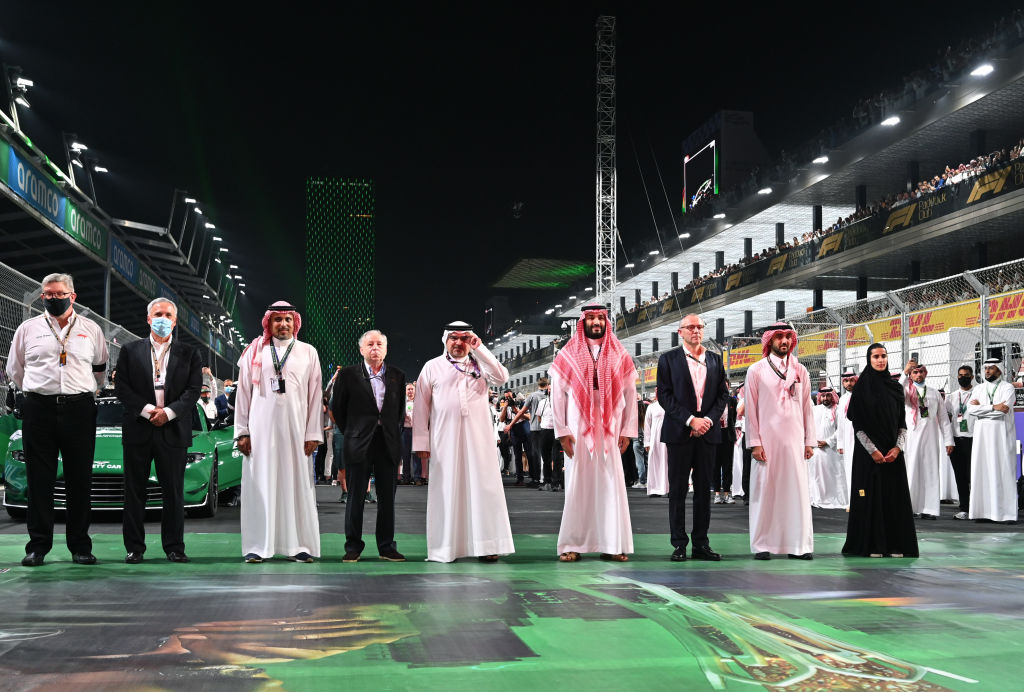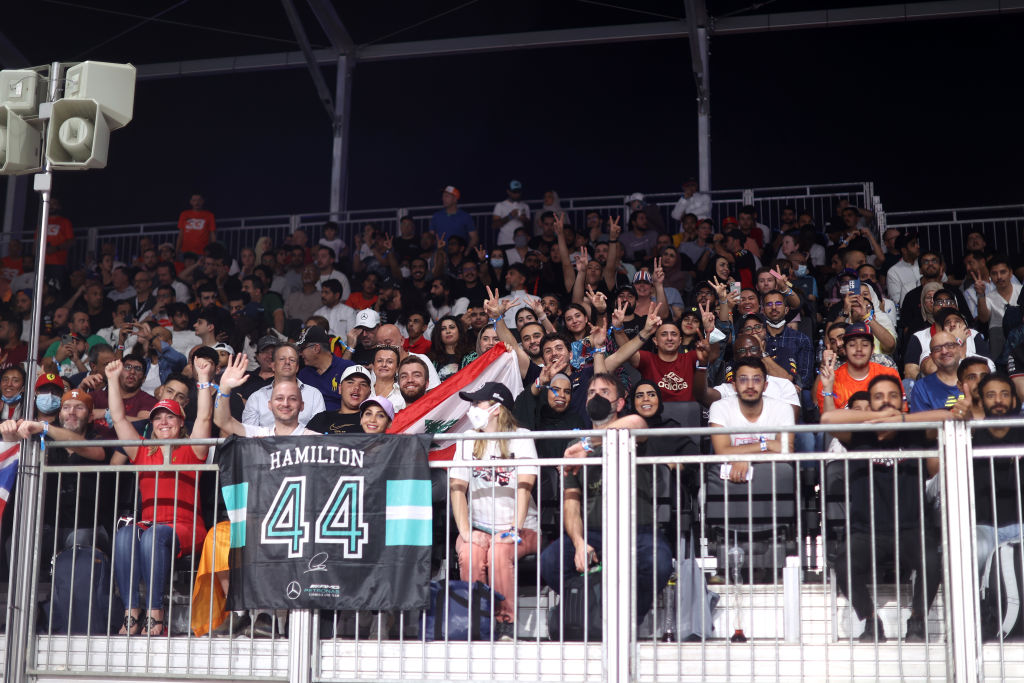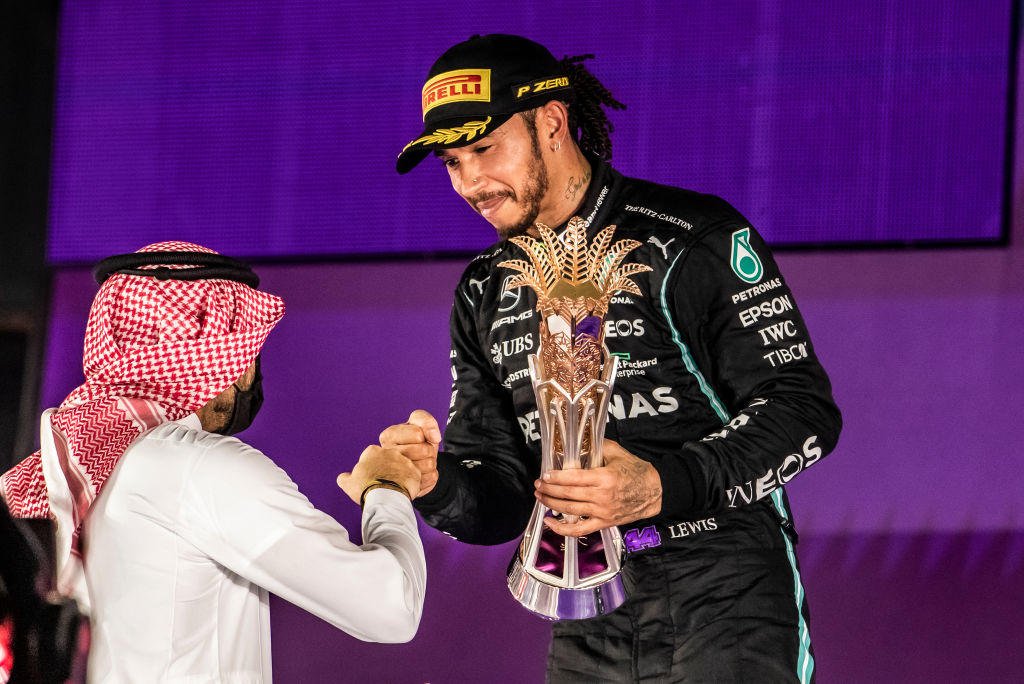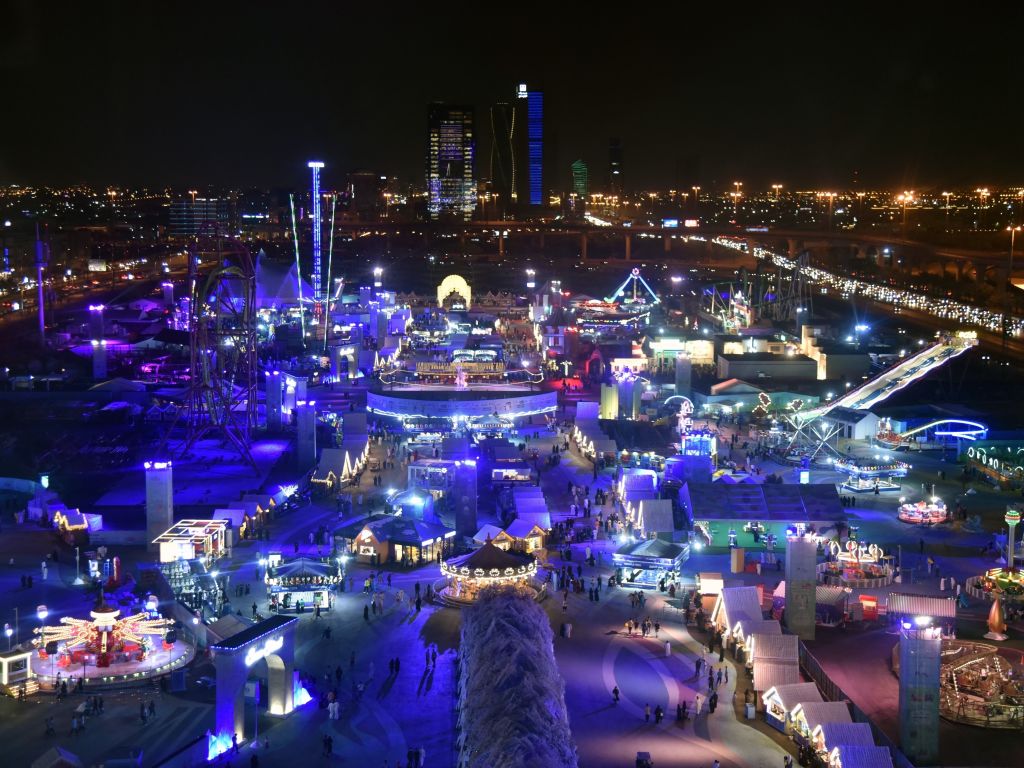
Standing in a luxury spectator stand on Saturday night, Abdullah Sarhan stared down at the newest track on the Formula 1 series, as the world’s top race-car drivers roared past in a blur, during this past weekend’s Grand Prix event.
His amazement was not the race itself. It was where it was happening: His home town of Jeddah, Saudi Arabia.
“For years, if we wanted to see something like this, we had to travel,” said Sarhan, a 29-year-old with long curly hair, wearing jeans and T-shirt, who works for his family’s hotel company in the Red Sea coastal city. “Now it’s happening five minutes from my house.”
The sense of the world opening up has—at least for many Saudis—injected a palpable excitement and a giddy sense of newness. In numerous interviews with TIME in the kingdom over the past week, young Saudis—nearly 70% of Saudi Arabia’s 34.8 million is younger than 35—said that their lives had markedly changed during the past three years, and that they were thrilled they could finally cut loose, after decades of cultural isolation and suffocating religiosity.
To anyone visiting Saudi Arabia after a long absence, as TIME’s correspondent did last week after four years, the change is evident.
Rules forbidding women to travel without a male relative’s permission, to work in public-facing jobs, to leave their heads uncovered—and most famously, to drive—have been scrapped in the past three years. Religious police, who until 2018 detained women for violating dress codes, have vanished from the streets.
Now, women with long flowing hair, some tinted pink or blue, fill the crowds at mass events like last weekend’s Formula 1 on Jeddah’s seafront. Even the women’s bathroom sign at the race featured a silhouette of a long-haired woman with bright lipstick.
At its first-ever Grand Prix, the kingdom celebrated with fireworks and crowds including top royals and government officials filling the venue to capacity.The race marked a milestone for Saudi Arabia, aligning the kingdom with top-level international competition and, by implication, cementing its perceived acceptability on the world stage.
It is that second prospect that has drawn fire from human rights groups in recent weeks, in the run-up to the Grand Prix. They accuse the titular Saudi ruler, Crown Prince Mohammed Bin Salman, or MBS as he is universally known, of “sportswashing,” using Saudi Arabia’s vast oil wealth to buy its way into the biggest sporting events, and so gloss over mounting human-rights violations. The country reportedly spent about $900 million to secure 10-year hosting rights for Formula 1 and in November, its Olympic Committee announced it would spend $694 million creating about 90 sports federations, training athletes from scratch to be world champions, much as China did decades ago.

All this is part of a carefully crafted strategy, micromanaged by MBS, who was given effective power by his father, King Salman, in 2017, when he was just 31. Named “Vision 2030,” MBS’s plan is geared toward ending almost 90 years of near-total dependence on vast oil reserves. By diversifying the economy and opening up to foreign investment and tourism with attractions such as big sporting events, the goal is to provide jobs for the new, wired generation.
But human rights activists and others detect another, unstated goal too: Keeping that generation compliant, and even content, under an autocratic monarchy, despite little prospect of Western-style democracy.
Few areas crystallize that social contract quite so starkly as professional sports. The vast sums that the Saudis are investing are fueling an unstoppable momentum, on which efforts to raise awareness of sportswashing or force boycotts have had little impact. In October, the government’s Public Investment Fund, of which MBS is chairman, snapped up Newcastle United soccer club for $409 million, giving it a toehold into the U.K.’s powerful Premier League. Even before then, Saudi Arabia had spent about $1.5 billion in recent years on investments in a wide range of professional sports, from boxing to chess, according to a March report by the British human rights group Grant Liberty.
Earlier this month, Human Rights Watch called the Saudi government’s giant sports investments, including in golf and soccer, “well-funded efforts to whitewash its image, despite a significant increase in repression over the last few years.”
The claim of sportswashing has little resonance among many Saudis, who believe that they finally have opportunities long enjoyed by the rest of the world.
“The country was closed off from the world,” Reema Juffali, 29, Saudi Arabia’s first female professional race-car driver, told TIME on Sunday, on the side of the race track. “Now it is changing, and they should support us wanting to.”
Human-rights observers strongly disagree, seeing in events like Formula 1 the endorsement of a repressive regime. They point to the country’s arrest of critics, the execution of nonviolent offenders, the heavy air bombardment of Houthi rebels in Yemen, and the use of flogging as punishment for homosexuality, which remains a crime in Saudi Arabia. Most shocking of all was the horrific killing and dismemberment in October, 2018 of Washington Post columnist Jamal Khashoggi, of which MBS has denied he had prior knowledge. A CIA report last February concluded that MBS, with his “absolute control” over Saudi intelligence services, very likely approved the operation.
Yet three years on, foreign investors—many flying into Jeddah to attend the Formula 1 event—are back in force. On Saturday, as the qualifying races got underway, French President Emmanuel Macron wrapped up a tour of the Gulf region with a visit toJeddah accompanied by a large contingent of French businesses. While Macron met with MBS, the French companies including BNP Paribas, Sanofi and EDF Renewables, signed 27 deals with Saudi companies. Macron was one of the first Western leaders to meet the Crown Prince since Khashoggi’s killing. U.S. President Joe Biden has refused to do so.
All that made last weekend’s Formula 1 race an important moment in Saudi Arabia’s rehabilitation, in spite of criticism by observers like Human Rights Watch. “Everyone is entitled to their opinion,” says Juffali, the female racing driver. ”But I think people have to come here and see it for themselves.”
While countless Saudis have embraced the flashy sporting events with huge enthusiasm, there is little sign that they are considering the moral questions or whether sports are being used as a political tool.
“I’ve spent a lot of time in the [Persian] Gulf, and I’ve never once heard anyone talk about sportswashing,” says Simon Chadwick, director of the Center for Eurasian Sport at the Emlyon Business School in Paris. “If you sit in Qatar, you sit in Saudi Arabia, it is nation building, it is soft power,” he says. “Sportswashing is in the eye of the beholder.”
Saudi Arabia is not the only rich authoritarian state to spend lavishly on sports, or to face accusations of sportswashing because of it. The mammoth multibillion-dollar global sports industry, which has benefited from the perception of being an apolitical crowd-pleaser, is increasingly becoming entangled in issues of human rights, corruption, and personal agency.
On Monday, U.S. officials announced they would not send a diplomatic delegation to the Beijing winter Olympic Games in February. That is in response to China’s brutal repression of the Uighur Muslims in the western province of Xinjiang, and its crackdown on protesters in Hong Kong. Great Britain, Canada and Australia also announced diplomatic boycotts of the Beijing Olympics. There are calls to boycott the 2022 FIFA World Cup soccer tournament next November in Qatar in protest against the wealthy Gulf state’s human rights record, following the deaths of dozens of migrant construction workers. Qatar, like Saudi Arabia, also outlaws homosexuality. The country has spent about $200 billion creating a vast infrastructure for the tournament, and it is reportedly paying about $500 million for the Premier League’s broadcast rights in the Middle East and North Africa—again drawing fury from human-rights observers.
As the controversy raged over the Jeddah car races, the world’s top race-car driver Lewis Hamilton wore a rainbow Pride crash helmet in Jeddah to support gay rights, which he first donned the previous week at the Qatar Formula 1 race; Hamilton won the Saudi Grand Prix in a chaotic final race on Sunday night, putting him one step closer to winning a record eight Formula 1 titles.

Yet even as more countries face accusations of sportswashing it is clear that for many citizens, the issue is often complex. In Saudi Arabia, for example MBS has maintained an authoritarian regime while allowing Saudis a markedly more relaxed personal lifestyle than they have enjoyed for decades—a two-pronged strategy that has helped toto consolidate his power.
The explosion of professional sports is closely interwoven with aspects of youth culture, giving Saudis the sense that, although they cannot elect their leaders or march in protests like their contemporaries in the U.S. or Europe, they can now enjoy the same culture as them.
In a country where live music had been banned for decades until 2018, thousands of young Saudis partied until 2.30 a.m. at Formula 1 on Saturday and Sunday at blowout post-race concerts by Justin Bieber, and DJ megastars David Guetta and Tiësto. During breaks between races, giant monitors along the track screened other music, with women gyrating behind DJs in skintight, hot-pink sequined bodysuits.
Until 2018, movie theaters were also banned in Saudi Arabia, deemed to violate Islamic strictures. Now, there are multiplexes across Riyadh and Jeddah packing theaters with movies like The House of Gucci. In the capital Riyadh, more than two million people have visited a giant entertainment zone called Riyadh Season over its six-week run, where they can catch nightly music or dance performances, go rock-climbing, or whizz down the world’s longest slide.

“Everything is different,” says Salma Sultan, 37, describing her life over the past three years. A Riyadh mother of a six-year-old, separated from her husband, she learned to drive after the ban on women driving was lifted in 2018, and now supplements her civil-service pay by driving for a ride-share company on her off-hours. “I am finally independent,” she says.
While the revamped regime has enabled Sultan to make a modest living for herself, at the much higher end of the economic spectrum, it has also allowed the generously-funded new Saudi sports industry to flourish. Outside Riyadh, a permanent Formula 1 racetrack is being built within the sprawling Qiddiya entertainment and sports city, which is being built by the amusement-park giant Six Flags. There is a separate Formula E track for electric race cars, in Riyadh’s restored historic area of Diriyah, with a race scheduled for February.
Sports organizations play a role in the dynamics that are playing out in countries like Saudi Arabia, say some observers who have tracked the industry for years. Bidding wars for sports clubs and hosting deals for events like the Olympics, Formula 1, and the FIFA soccer World Cup have increasingly attracted—and been won by—rich, state-dominated countries, like Russia, Qatar and Saudi Arabia. Paris Saint-Germain, one of Europe’s wealthiest soccer clubs, is able to pay its superstar players Lionel Messi, Kylian Mbappé and Neymar small fortunes partly because it is owned by Qatar’s sovereign wealth fund.
Formula 1, often associated with glamor and celebrity-studded crowds, attracts dizzying sums and its Paris-based international federation, known as the FIA, has signed increasingly large hosting contracts. “The sport faces some huge challenges if it wants to preserve its reputation and not be known as a money-grabbing plutocracy,” wrote a Formula 1 analyst last year, when Saudi Arabia negotiated its hosting contract.
From the stands high above the race track in Jeddah last weekend, racing fan Sarhan did not see a plutocracy. What he saw was young Saudis like himself being able to enjoy themselves in a way they weren’t able to before 2018. Looking around the Formula 1 luxury stand, at young people laughing and sipping sodas, he dismissed the idea of sportswashing and embraced what he sees as new freedoms. “You would never see this before,” he said. The crown prince’s ambitious plans for the kingdom indicate that young Saudis like Sarhan will see more evenings like it.
—With reporting by Sean Gregory
More Must-Reads from TIME
- Donald Trump Is TIME's 2024 Person of the Year
- TIME’s Top 10 Photos of 2024
- Why Gen Z Is Drinking Less
- The Best Movies About Cooking
- Why Is Anxiety Worse at Night?
- A Head-to-Toe Guide to Treating Dry Skin
- Why Street Cats Are Taking Over Urban Neighborhoods
- Column: Jimmy Carter’s Global Legacy Was Moral Clarity
Contact us at letters@time.com